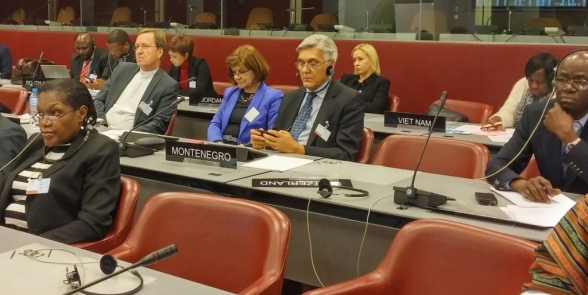During the meeting of the Association of Secretaries General of Parliaments, which started on 18 October, through numerous speeches and debates, secretaries general from parliaments of over 80 countries have shared experiences and opinions on many current issues and challenges their parliamentary administrations were facing in their daily operations, such as the parliamentary oversight of secondary legislation, the role of parliament in strategic planning at the national level, regulation of financial compensation to MPs, communication of parliaments with the public, access to the parliament for persons with disabilities, etc.
There were three general debates on the agenda, on topics of social composition of parliaments, prevention of conflict of interest in parliaments, and influence of direct election of chairpersons of parliamentary committees. The secretaries general paid special attention to conflict of interest, while they discussed several segments of this issue, such as the existence of limitation on MPs to perform other duties and tasks, obligation to report income and property, prohibition of receiving gifts, as well as their limited right to speak and vote on a topic in which they have a private interest. Working in several groups, all secretaries general briefly presented legislative solutions and practices in their respective parliaments. Secretary General of the Parliament of Montenegro Mr Siniša Stanković presented key provisions of the current Law on Prevention of Conflict of Interest and the Law on Prevention of Corruption, whose implementation will begin in the following year, and provisions of the Code of Ethics for MPs. The debate has shown that nearly all countries have provisions limiting professional engagement of MPs outside the parliament, with certain exceptions, such as provisions in respect of reporting property, while there were differences in the scope of reports, their publishing, and control. Considerable differences between the parliaments were present in respect of limiting the right of MPs to express the position of their MP Group or committee, as well as to participate in voting on issues in which they have a private interest. It was pointed out during the debate that the existence of conflict of interest did not imply the existence of corruption, and that there should be differentiation between the direct financial interest of MPs and the private interest in certain area, because then it could happen that MPs most knowledgeable on a topic could be denied the opportunity to present their views and to vote.
Today, on the last day of the meeting of the Association and the session of the Parliamentary Assembly, a joint conference of IPU and Association of Secretaries General of Parliaments was held, dedicated to strengthening parliaments through building institutional capacities for effective parliamentary oversight. Some examples of good practices were presented, as well challenges and opportunities for strengthening the oversight role of parliaments, which will be used in preparation of the Second Parliamentary Report on the topic: “Power of the Parliament to seek accountability from the Government: reality and prospects”.









